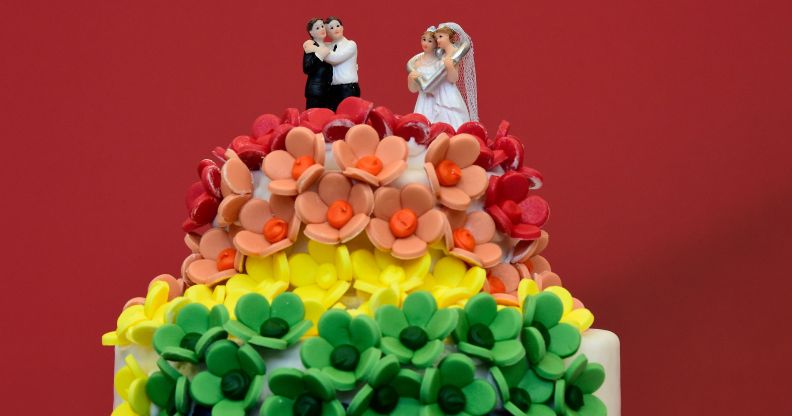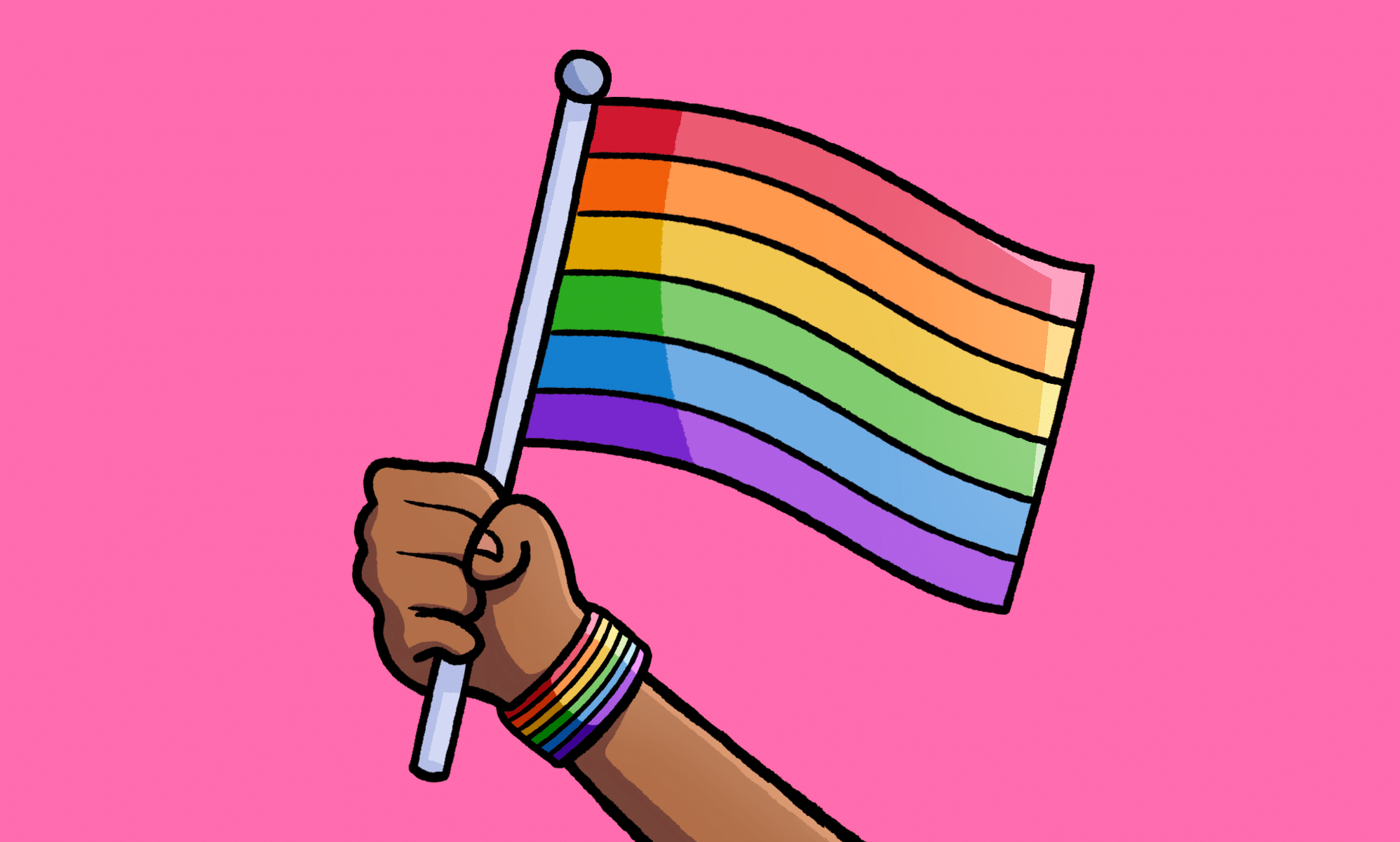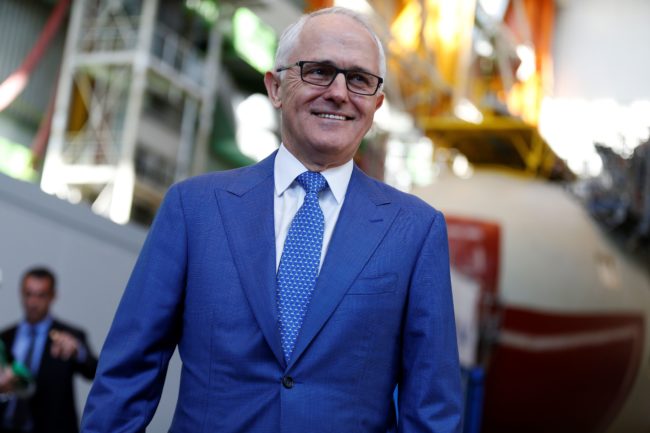What the hell is going on with same-sex marriage in Australia?

Supporters of same-sex marriage campaign in Australia (Getty)
Australia is facing a tidal wave of homophobic hate speech ahead of an unauthorised vote on equal marriage that pretty much no one actually wants. What the hell is going on?
More than four years after neighbouring New Zealand’s Parliament passed an equal marriage law without incident, Australia’s Prime Minister is instead putting the issue to the people – and has unleashed a Pandora’s Box of anti-LGBT hate speech as the ‘No’ campaign kicks into gear.
What the hell is going on?
The answer involves a coup, more than one shadowy deal, and a lot of shameless political manoeuvring.
So what is happening?
The country’s current Prime Minister, Malcolm Turnbull, has refused to put equal marriage to a vote of MPs in Parliament.

Instead he planning to hold a ‘postal vote’ on the issue, which is set to go forward at the end of September.
That’s like a referendum, right?
No.
Mr Turnbull is not seeking permission from Parliament to hold the postal vote, which means it’s likely going ahead without any legislation behind it.
The vote will not be subject to usual rules governing elections, and will be held by the Australian Bureau of Statistics, a little-known government department which usually runs the Census and does data analysis.
There will be no polling stations, Australia’s compulsory voting laws will not apply, and voting will be carried out entirely by post.
It is entirely non-binding and ‘advisory’ in nature, which means that MPs will not be bound by its result.
Wait, can they just do that?!
Maybe.
A legal challenge is in progress arguing that Mr Turnbull needs to seek authorisation from Parliament in order to put the issue to the public.
The case will be heard by the country’s High Court early next month, with an LGBT charity and a number of same-sex couples arguing that it is illegal to hold such a vote.
They are backed by the Public Interest Advocacy Centre, which will argue “the government is acting beyond its power [and] cannot validly undertake a postal vote without parliamentary approval.”
The postal vote will not go ahead before the court rules on it.
Why are LGBT campaigners trying to derail a chance to secure equal marriage?
Unlike in Ireland, where a referendum on the issue was required under the country’s Constitution, there is no requirement whatsoever for Mr Abbott to hold a public vote.
LGBT campaigners have expressed fears about the nature of the postal vote and its possible openness to fraud, while they warned that it will also lead to a boom in anti-gay hate speech. No draft marriage bill has been published ahead of the vote, so it’s anyone’s guess what the government-drafted law will actually include.
If the legal challenge successfully blocks the vote, the campaigners hope to up the ante on Mr Turnbull to solve the issue by holding a vote in Parliament, where a majority of MPs support equal marriage and a bill could likely pass quickly.
But the challenge does not mean that campaigners are ignoring the prospect of a postal vote.
A ‘Yes’ campaign has already launched, ensuring that if the postal vote goes ahead, it will be a fight to win.
The Executive Director of The Equality Campaign, Tiernan Brady, said: “The campaign will continue to exhaust every political and legal avenue to stop this unnecessary and non-binding survey that sets a terrible precedent for Australia.
“However, we must also be prepared for the very real possibility of a postal plebiscite if our legal challenge is defeated.
“If we are faced with a postal plebiscite we have a duty to every Australian who supports fairness and equality to win it.”
Are voters likely to back equal marriage?
Given recent developments in the US and UK, we’re of the opinion that trying to predict the result of public votes is a fools’ game.
But every single poll on the issue has found that a majority of Australians support equal marriage by a wide margin.
Polling conducted by Newspoll this week showed that 63 percent of Australians support equal marriage, with a comfortable lead over the ‘No’ camp.
However, there are a number of rogue factors.
The registration window for voters is very short, which may mean lower participation from younger people who are more likely to support equality.
The postal vote itself is also unpopular among strong ‘Yes’ voters, leading to fears of a boycott.
In addition, the method of voting could give the No camp an inbuilt structural advantage. There is no precedent for entirely-postal voting in the country, but experts believe older people, who are more likely to oppose equal marriage, will be the most likely to vote.
One of the biggest unknowns is a new tactic among the global anti-LGBT lobby, which has been attempting to use transgender issues as a wedge.
Though gay rights enjoy popular support, trans issues often remain divisive – and conservatives are already attempting to exploit this disparity.
This tactic has already been deployed to great effect in America – and it’s been worryingly successful.
In the city of Houston, anti-LGBT conservatives managed to convince voters to repeal discrimination protections for LGBT people that polling showed they overwhelmingly supported.
Following on from that win, the US-based campaigners have developed a box of identikit dirty tricks to replicate this manoeuvre, which includes a video of a fictional little girl getting raped by a transgender person in a bathroom.
Outrageous? Absolutely. Bigoted? It’s vile. Effective? Evidence so far shows it could be.
Politics doesn’t exist in a vacuum, and ahead of the postal vote there are signs of the ‘No’ campaign beginning to lay the groundwork for the bait-and-switch, despite the obvious duplicitousness.
LGBT campaigners are yet to develop a solid response to this scaremongering that doesn’t put off swing voters.
Basically, if enough people turn out, and both sides are talking about gay people getting married, then we expect a win for marriage equality.
Otherwise, it could be anyone’s game.
If people vote for equal marriage, does it automatically become law?
No. Initially, nothing happens.
As the postal vote is non-binding and advisory, it has all the legal clout of a glorified opinion poll.
The immediate effect will likely be that the government permits legislation on equal marriage to go forward in Parliament, hoping to resolve the issue there before the end of the year.
If there’s a strong vote in favour of equality it will certainly focus a few minds for MPs hoping for re-election, but plenty of hardliners have vowed to oppose the legislation no matter what.
There will presumably be a majority in Parliament for equality, but there’s still the issue of drawing up an equal marriage bill that enough politicians actually agree with.
The government won’t publish its own draft bill in advance, so Turnbull’s intentions remain unclear.
If the government decides to put forward its own legislation on the issue, consensus could collapse over divisive ‘religious freedom’ protections that undermine anti-LGBT discrimination protections.
Disagreements over whether churches should be allowed to carry out same-sex marriages will also be a hurdle.
There are existing opposition and backbench marriage bills which are cleaner, but it’s unclear if they would gain government support.
Though defying the voters would be a brazen move, there are plenty of scenarios where a vote for equal marriage does not not necessarily guarantee the end result that campaigners hope for.
Who is Malcolm Turnbull and why is he doing this?
Prime Minister since 2015, Malcolm Turnbull came to power after deposing Tony Abbott in an internal party coup.
The leader privately supports equal marriage, but his fragile Coalition government, made up of the Liberal Party and National Party, is bitterly divided on the issue.

The Nationals and a powerful right-wing faction of the Liberals – including prominent members of Turnbull’s Cabinet – are strongly opposed to equal marriage, while centrists and the youth wing of the Liberals are in favour of reform.
The acrimonious rift came to a head earlier this month, with Mr Turnbull caught between the two factions.
On one side, pro-gay rebels within the Liberals had threatened to side with the opposition in order to pass a equal marriage bill through Parliament.
On the other, right-wingers threatened a leadership challenge against Mr Turnbull if the marriage bill was allowed to pass.
Confronted with insubordination on two sides and MPs openly discussing a challenge, he did all he could do to salvage his leadership – and fudged.
The leader had already seen a defeat in the Senate on a bill calling for a formal plebiscite (public vote) on the issue, so he opted to go ahead with the postal vote without consent from Parliament, hoping to appease his party and save his own neck.
Why is this such an issue for Liberals?
How Mr Turnbull handles equal marriage is directly tied to his own premiership, because of a promise he is alleged to have made to right-wingers to shore up support for his 2015 leadership challenge.
Though many Liberal MPs wanted rid of the politically-toxic party leader Tony Abbott, they had reservations about Turnbull due to his public support for equal marriage.

As a condition for them supporting his leadership bid, Turnbull gave private assurances to his party’s anti-LGBT lobby that he would not seek to pass equal marriage through Parliament – a concession that would come back to haunt him.
Plans for a public vote were duly enshrined in the party’s 2016 manifesto. Right-wingers interpreted this as a commitment against holding a vote in Parliament without asking the public first.
But while the right-wing faction shout about one promise from a leader, the pro-LGBT lobby accused Mr Turnbull of going against another from another.
In the dying days of Tony Abbott’s leadership in 2015, the government whipped MPs to vote against a bill attempting to bring about equal marriage.
After disquiet on the issue, Mr Abbott assured his party that it “would be the final term of parliament where Liberal MPs are bound on the issue”.
There’s been an election since then, so by Mr Abbott’s words, Liberal MPs should be free by now to vote for equal marriage.
All sides within the Coalition see promises made to them being broken. None are particularly happy.
Where do the opposition parties stand?
The fringe One Nation party, which has been embroiled in several homophobia scandals, is the only party actively opposed to equality.
In contrast to the turmoil within the Liberal Party, nearly all of Australia’s major opposition parties have lined up in favour of equal marriage but against the postal vote.
The main opposition Labor Party has become a strong voice in favour of equal marriage, while the Greens, Liberal Democrats and Nick Xenophon Team (yes, that’s a thing) all support equality.
Labor leader Bill Shorten has vowed to push for equality, with gay Labor Senator Penny Wong also taking a leading role in calling for equal marriage.

The Labor Party even offered to work with the government to put a cross-party equal marriage bill before Parliament.
But the party voted against a formal plebiscite after hearing concerns from LGBT campaigners, and Mr Shorten has been harshly critical of the PM for pushing ahead with a postal vote.
He said: “There will be no protection against ballot fraud, electoral bribery, intimidation, interfering with the electoral roll or publishing misleading and deceptive material.
“[The Prime Minister] is giving his blessing to billboards, websites, pamphlets, TV advertising and online material that will vilify and demean LGBTI Australians and their children.
“We know this bile will end up in the playground, in the schoolyard and on the sporting field. The slogans will be shouted at the children of same-sex couples. Young people who are gay will be confronted by it on social media every day.
“I loathe the trolls and the haters but I expected more from the Prime Minister. I hold the Prime Minister responsible for every hurtful bit of filth this debate will unleash.
“That is not because the Prime Minister has said it, not because the Prime Minister agrees with it—he clearly doesn’t—but because the Prime Minister has licensed this debate.
“You are the leader, Mr Turnbull; you have given permission. I will never hold you in the same light again. I hold the Prime Minister responsible and Australians will too.”

